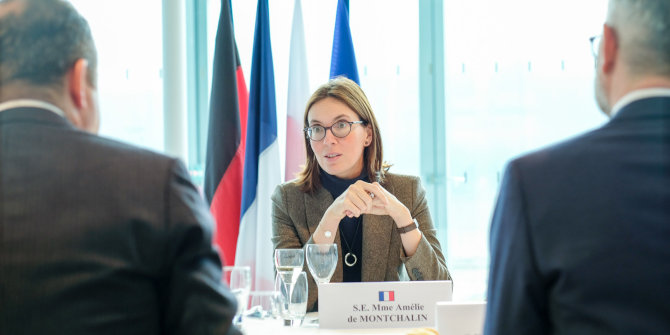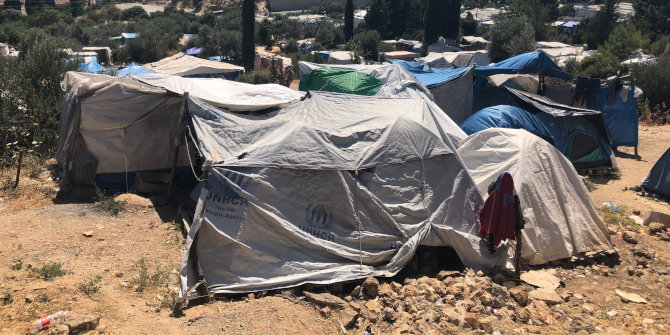 The so called ‘Weimar Triangle’ is a framework for cooperation between France, Germany and Poland. While meetings have been held under the format since 1991, the last full summit involving heads of state took place in 2011. Bartlomiej Kulpa examines whether the reshaping of the EU following Brexit might lead to a revival of the framework.
The so called ‘Weimar Triangle’ is a framework for cooperation between France, Germany and Poland. While meetings have been held under the format since 1991, the last full summit involving heads of state took place in 2011. Bartlomiej Kulpa examines whether the reshaping of the EU following Brexit might lead to a revival of the framework.
Europeans have always dreamt of exerting global influence commensurate with their economic weight. The UK’s withdrawal from the EU will have far-reaching geopolitical implications in this respect, not only for Britain but also for the EU itself. In practice, Brexit will change the balance of power within the EU. In light of this, the future of the EU will be decided by two factors, namely social prosperity and a lasting peace.
One question that is worth considering is whether Britain’s departure from the EU might revive the French-German-Polish ‘Weimar Triangle’, which could subsequently act as a driving force for future EU prosperity. This tripartite partnership was initiated in Weimar, the city of polymath genius Johann Wolfgang von Goethe, in August 1991. The most recent meeting under the Weimar Triangle format took place in Lens, Pas-de-Calais, in January 2020, but the last full summit involving heads of state was in 2011. Of the three countries, Poland has traditionally been the most “pro-Weimarian”. From a political point of view, the Weimar Triangle could (but does not) serve as a bridge between the members and non-members of the Eurozone, though the partnership is not formally an organisation under international law.
Energy security
One of the areas where Paris, Berlin and Warsaw have different opinions is the EU’s energy policy. As the Polish economy is heavily reliant on coal-fired power stations, Poland did not sign up to the EU’s 2050 decarbonisation target agreed by European leaders in December 2019. Furthermore, Germany’s decision to negotiate directly and bilaterally with Russia over the construction of the Nord Stream twin pipeline system going through the Baltic Sea (and therefore avoiding Poland and the Baltic republics) led to anger and frustration in Poland. Energy security is a top priority for Warsaw. For example, Poland has recently announced that the Baltic Pipe, which is a strategic infrastructure project to transport gas from Norway to the Danish and Polish markets, would be launched on 1 October 2022. The Baltic Pipe would increase the country’s energy diversification.
EU policy toward Ukraine
Another issue of crucial importance is the EU’s policy toward Ukraine. It should be stressed that Poland was the first country to officially recognise the independence of Ukraine in 1991. Subsequently, as an EU member state, Poland has become a staunch advocate of Ukraine’s reforms and European path. However, France’s approach has been a major obstacle to developing an effective EU policy toward Ukraine. Unlike Berlin and Warsaw, Paris has tried to forge a new relationship with Moscow, gambling that reaching out to the Kremlin can turn Russia into a security partner for the EU. What is more, as the most recent examples of Albania and North Macedonia show, France has no appetite for further enlargement of the EU.

French Minister for European Affairs, Amélie de Montchalin, at a Weimar Triangle meeting with her German and Polish counterparts in January 2020, Credit: francediplomatie (CC BY-NC 2.0)
It is worth pointing out that Franco-Polish relations have soured since the Polish government decided to cancel a multibillion-euro military helicopter deal with Airbus in 2016. Although Emmanuel Macron visited Poland in February, this was his first visit to Poland since he took the helm as French President in 2017. As long as the ruling right-wing Law and Justice Party (PiS) is perceived by France to be violating the rule of law and dismantling the independent judiciary in Poland, there is unlikely to be room for improvement in bilateral relations.
Military operations
The next issue that has to be addressed is the Iraq War that began in 2003. There was considerable disagreement between France, Germany and Poland over the conflict. Paris and Berlin bitterly opposed US involvement in Iraq, whereas Warsaw backed the US military plans for intervention.
Similarly, Paris, Berlin and Warsaw did not speak with one voice when in January 2013 France launched Operation Serval to halt the forward movement of armed Islamist insurgents in Mali. It was alleged, at the time, that France was attempting to use the EU member states to continue its strong influence on the francophone countries of West Africa and this was one of the reasons why Germany and Poland were hesitant about joining the campaign. Moreover, as far as Poland is concerned, Polish foreign policy does not primarily focus on Africa. In practice, Poland’s outlook toward the continent is limited to North Africa. Hence, its business, political and diplomatic presence on the continent is insubstantial. It should also be noted that, unlike France and Germany, Poland considers itself a potential reference country for any African nation going through a transition to democracy.
The benefits of the Weimar Triangle remain largely symbolic. Furthermore, it might be argued that the term ‘triangle’ does not amount to an apt description of trilateral relations between France, Germany and Poland. First, the three actors are far from equal: France and Poland do not have as much influence on Germany as France and Germany have on Poland. Second, the three countries compete economically and politically with each other within the EU and on the international scene. What is more, since Poland is one of the two countries that launched the Three Seas Initiative in 2015, which is comprised of 12 EU member states, it is likely that Warsaw will treat this project as being more geostrategically important than other frameworks such as the Weimar Triangle.
As such, a revival of the Weimar Triangle seems unlikely in the near future. France, Germany and Poland are presently more divided than united. However, this does not mean that Paris, Berlin and Warsaw should not try to reach a consensus on various issues, such as energy security and Ukraine. In order to do so, the three actors ought to engage in a serious political dialogue. That would enable them to improve mutual understanding, overcome negative perceptions and develop the common tools needed to tackle shared political and economic problems.
Please read our comments policy before commenting.
Note: This article gives the views of the author, not the position of EUROPP – European Politics and Policy or the London School of Economics.
_________________________________
 Bartlomiej Kulpa
Bartlomiej Kulpa
Bartlomiej Kulpa holds an LLM in EU law from the University of Westminster, London, and works for an international law firm. He is on Twitter @KulpaBart



